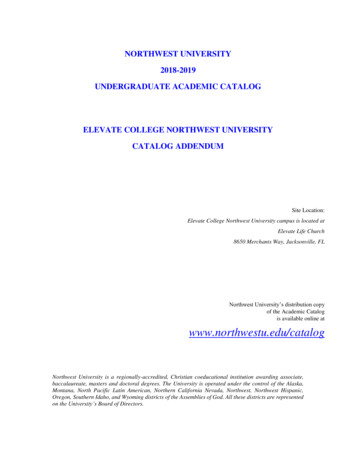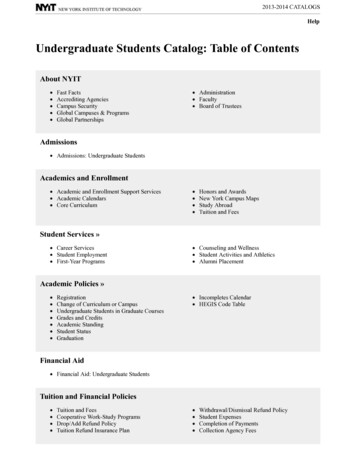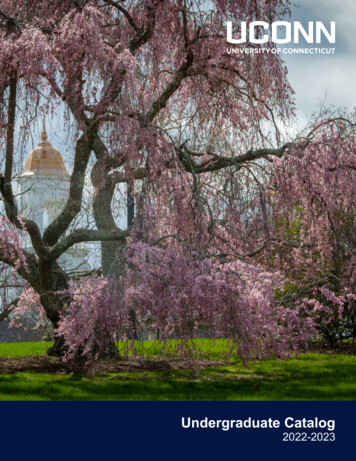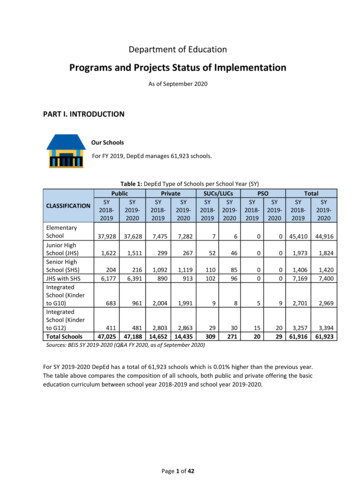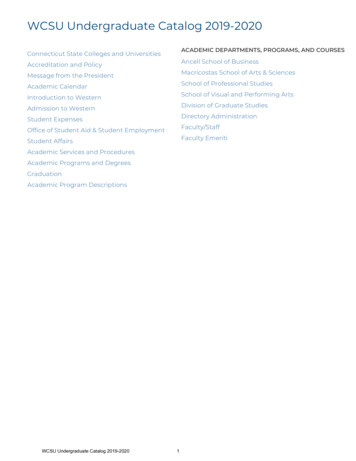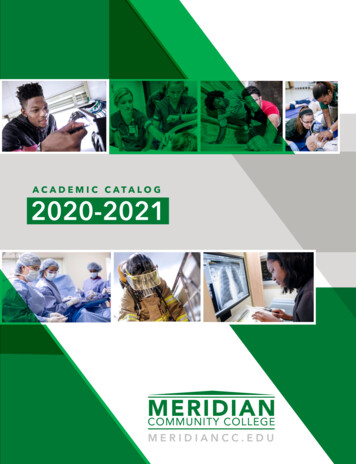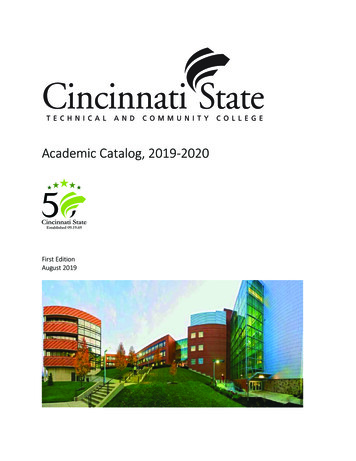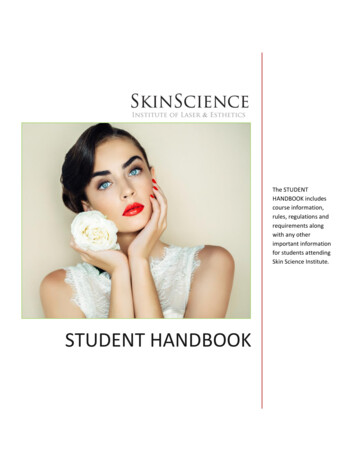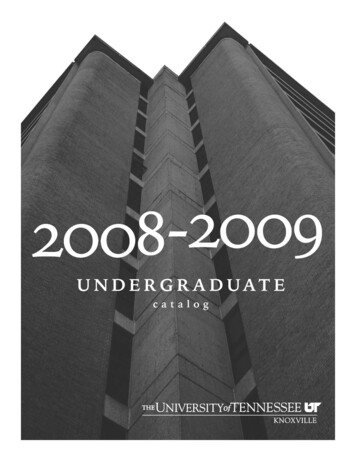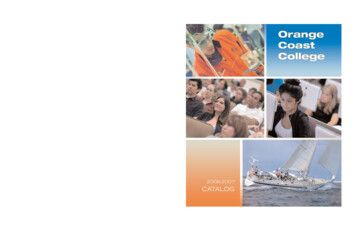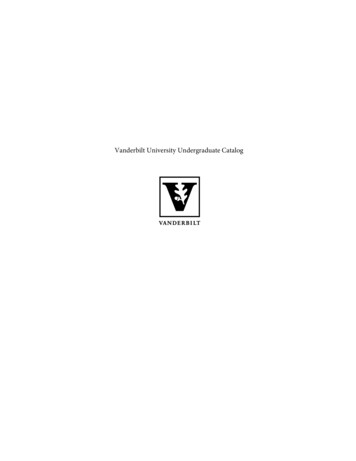
Transcription
Vanderbilt University Undergraduate CatalogVVANDERBILT
Calendar 2019/2020FALL SEMESTER 2019Classes begin / Wednesday 21 AugustRegistration ends / Wednesday 28 August, 11:59 p.m.Deadline to pay fall charges / Saturday 31 AugustFamily Weekend / Friday 20 September–Sunday 22 SeptemberHomecoming and related activities / Sunday 13 October–Saturday 19 OctoberFall break / Thursday 24 October–Friday 25 OctoberThanksgiving holidays / Saturday 23 November–Sunday 1 DecemberClasses end / Thursday 5 DecemberReading days and examinations / Friday 6 December–Saturday 14 DecemberFall semester ends / Saturday 14 DecemberSPRING SEMESTER 2020Deadline to pay spring charges / Thursday 2 JanuaryClasses begin / Monday 6 JanuaryRegistration ends / Monday 13 January, 11:59 p.m.Spring holidays / Saturday 29 February–Sunday 8 MarchClasses end / Monday 20 AprilReading days and examinations / Tuesday 21 April–Thursday 30 AprilCommencement / Friday 8 MayMAYMESTER 2020Classes begin / Monday 4 MayClasses end; examinations / Friday 29 MaySUMMER SESSION 2020Classes begin / Tuesday 2 JuneExaminations for first-half courses / Friday 3 JulySecond-half courses begin / Tuesday 7 JulyExaminations for second-half and full-term summer courses / Friday 7 August
UndergraduateCatalogCollege of Arts and ScienceBlair School of MusicSchool of EngineeringPeabody College1VanderbiltUniversity2019/2020Containing general informationand courses of studyfor the 2019/2020 sessioncorrected to 15 June 2019Nashville
The university reserves the right, through its established procedures, to modify the requirements for admission and graduation and to change other rules,regulations, and provisions, including those stated in this catalog and other publications, and to refuse admission to any student, or to require the withdrawal of a student if it is determined to be in the interest of the student or the university. All students, full- or part-time, who are enrolled in Vanderbiltcourses are subject to the same policies. Policies concerning noncurricular matters and concerning withdrawal for medical or emotional reasons can befound in the Student Handbook, which is on the Vanderbilt website at vanderbilt.edu/student handbook.NONDISCRIMINATION STATEMENTIn compliance with federal law, including the provisions of Title VI and Title VII of the Civil Rights Act of 1964, Title IX of the Education Amendment of 1972,Sections 503 and 504 of the Rehabilitation Act of 1973, the Americans with Disabilities Act (ADA) of 1990,the ADA Amendments Act of 2008, ExecutiveOrder 11246, the Vietnam Era Veterans Readjustment Assistance Act of 1974 as amended by the Jobs for Veterans Act, and the Uniformed ServicesEmployment and Reemployment Rights Act, as amended, and the Genetic Information Nondiscrimination Act of 2008, Vanderbilt University does notdiscriminate against individuals on the basis of their race, sex, sexual orientation, gender identity, religion, color, national or ethnic origin, age, disability,military service, covered veterans status, or genetic information in its administration of educational policies, programs, or activities; admissions policies;scholarship and loan programs; athletic or other university-administered programs; or employment. In addition, the university does not discriminate againstindividuals on the basis of their gender expression. Requests for information, inquiries, or complaints should be directed to these offices: Faculty andstaff—Equal Employment Opportunity Office, Anita J. Jenious, director, eeoinfo@vanderbilt.edu, telephone (615) 343-9336; Students—Title IX andStudent Discrimination, Molly Zlock, Title IX coordinator and director, titleixandstudentdiscrimination@vanderbilt.edu, telephone (615) 343-9004, 11021st Avenue South, Suite 975, Nashville TN 37203; Students—Student Access Services, Jamie Bojarski, director, disabilityservices@vanderbilt.edu,telephone (615) 343-9727.Vanderbilt and the Vanderbilt logos are registered trademarks of The Vanderbilt University. 2019 Vanderbilt University. All rights reserved.Produced by Vanderbilt University Marketing Solutions and Vanderbilt Printing Services.The text of this catalog is printed on recycled paper with ink made from renewable resources.This publication is recyclable. Please recycle it.Printed in the United States of America
ContentsThe University6Special Programs for Undergraduates10Life at Vanderbilt19Admission31Financial Information39College of Arts and Science49A&SBlair School of Music237BSchool of Engineering283EPeabody College349PIndex398Communicating with Vanderbilt405
6VANDERBILT UNIVERSITYThe UniversityCOMMODORE Cornelius Vanderbilt, who gave a million dollars to build and endow Vanderbilt Universityin 1873, expressed the wish that it “contribute . . . tostrengthening the ties which should exist between all geographical sections of our common country.”A little more than a hundred years later, the VanderbiltBoard of Trust adopted the following mission statement:“We reafrm our belief in the unique and special contributions that Vanderbilt can make toward meeting the nation’srequirements for scholarly teaching, training, investigation,and service, and we reafrm our conviction that to fulfll itsinherited responsibilities, Vanderbilt must relentlessly pursuea lasting future and seek highest quality in its educationalundertakings.”Today as Vanderbilt pursues its mission, the universitymore than fulflls the Commodore’s hope. It is one of a fewindependent universities with both a quality undergraduate program and a full range of graduate and professionalprograms. It has a strong faculty of more than 4,200 full-timemembers and a diverse student body of more than 12,500. Students from many regions, backgrounds, and disciplines cometogether for multidisciplinary study and research.Te 334-acre campus is about one and one-half milesfrom the downtown business district of the city of Nashville,combining the advantages of an urban location with a peaceful, park-like setting of broad lawns, shaded paths, and quietplazas.Of-campus facilities include Vanderbilt Dyer Observatory,situated on a 1,131-foot hill six miles south.Te schools of the university ofer the following degrees:College of Arts and Science. Bachelor of Arts.Blair School of Music. Bachelor of Music, Bachelor ofMusical Arts.Divinity School. Master of Divinity, Master of TheologicalStudies, Master of Theology.School of Engineering. Bachelor of Engineering, Bachelor ofScience, Master of Engineering.Graduate School. Master of Arts, Master of Fine Arts,Master of Liberal Arts and Science, Master of Science,Doctor of Philosophy.Law School. Master of Laws, Doctor of Jurisprudence.School of Medicine. Master of Education of the Deaf,Master of Genetic Counseling, Master of Public Health,Master of Science in Clinical Investigation, Master ofLaboratory Investigation, Master of Science in MedicalPhysics, Master of Science (Applied Clinical Informatics,Speech-Language Pathology), Doctor of Audiology,Doctor of Medical Physics, Doctor of Medicine.School of Nursing. Master of Science in Nursing, Doctor ofNursing Practice.Owen Graduate School of Management. Master of Accountancy, Master of Business Administration, Master ofManagement in Health Care, Master of Marketing,Master of Science in Finance.Peabody College. Bachelor of Science, Master of Education,Master of Public Policy, Doctor of Education.No honorary degrees are conferred.Mission, Goals, and ValuesVanderbilt University is a center for scholarly research,informed and creative teaching, and service to the community and society at large. Vanderbilt will uphold the higheststandards and be a leader in the quest for new knowledge through scholarship,dissemination of knowledge through teaching andoutreach,creative experimentation of ideas and concepts.In pursuit of these goals, Vanderbilt values most highly intellectual freedom that supports open inquiry,equality, compassion, and excellence in all endeavors.AccreditationVanderbilt University is accredited by the Southern Association of Colleges and Schools Commission on Colleges to awardbachelor’s, master’s, professional, and doctoral degrees. Contactthe Southern Association of Colleges and Schools Commissionon Colleges at 1866 Southern Lane, Decatur, Georgia 300334097, call (404) 679-4500, or visit sacscoc.org for questions aboutthe accreditation of Vanderbilt University.Equity, Diversity, and InclusionExcellence at Vanderbilt is inextricably tied to the university’scommitment to fostering an inclusive community where peopleof all identities, backgrounds, and perspectives can thrive. TeVice Provost for Strategic Initiatives and the Vice Chancellorfor Equity, Diversity and Inclusion and Chief Diversity Ofcerwork in partnership with students, faculty, and staf to identifyand implement best practices that advance equity, diversity, andinclusion across campus in pursuit of building and supportingan inclusive community enriched by a broad variety of experiences and knowledge. Visit vanderbilt.edu/diversity for moreinformation.The Jean and Alexander Heard LibrariesThe Jean and Alexander Heard Libraries system at VanderbiltUniversity houses nearly five million items and providesaccess to millions more resources through its nine campuslibraries: Central Library (A&S); Peabody Library; Annetteand Irwin Eskind Family Biomedical Library and LearningCenter; Walker Management Library; Wilson Music Library;Massey Law Library; Stevenson Science and EngineeringLibrary; the Divinity Library; and the Special CollectionsLibrary. These libraries share an online presence that providesaccess to an integrated catalog of print and e-resources, as wellas information about library services, workshops, programs,exhibitions, research guides, and librarian subject specialists.Library staff teach students to be information literate andhelp them develop research skills in an increasingly complexinformation environment. Students can connect with a librarian in person or ask questions through the library website.
Undergraduate Catalog / The UniversityLibrary spaces across campus offer quiet individual studyspaces, group study, and instructional rooms, as well aslearning commons and cafes. Faculty- and student-curatedexhibitions throughout the libraries offer intellectual andcreative insights that encourage students to think criticallyand see their own work in new ways. Students, faculty, andstaff come to the library to read in a cozy nook, meet friendsfor group study, grab a quick meal, or attend an author’s talk.Even if you are off campus, digital library resources are at yourfingertips via your phone, laptop, or computer.The oldest items in the library date from ca. 2500 BCE,and new publications are being added every day. Amongthe collection strengths are: Latin American history, politics,and culture; the History of Medicine Collections; the W. T.Bandy Center for Baudelaire and Modern French Studies;the Southern Literature and Culture Collections; the UnitedStates Playing Card Collection; and the Vanderbilt TelevisionNews Archive, the world’s most extensive archive of televisionnews covering 1968 to present. The libraries are also involvedin digital scholarship, publishing and partnering with facultyon the Revised Common Lectionary, one of the first publishedweb-based resources of scriptural readings for the liturgicalyear, Ecclesiastical and Secular Sources for Slave Societies, adigital preservation program for endangered documentsrelated to slave societies, the Global Music Archive, a multimedia archive for traditional and popular song, music, and danceof Africa and the Americas, and Syriaca, a digital project forthe study of Syriac literature, culture, and history.Get to know your libraries and your librarians early in yourcareer at Vanderbilt. They have the information you need—and can help you transform that information into knowledge,creativity, and success.Information TechnologyVanderbilt University Information Technology offers voice,video, data, computing, and conferencing services to Vanderbilt students, faculty, and staff, and provides free antivirusdownloads and malware prevention in the residence halls andin many campus areas.VUIT maintains and supports VUnet, the campuswide datanetwork that provides access to the internet, and AccessVU, theauthentication service that enables Vanderbilt users to securelyidentify themselves to many services on VUnet. Tose servicesinclude YES (Your Enrollment Services), Brightspace, and VUGmail, the university’s email system of choice for Vanderbiltundergraduates.It is important to note that many wireless consumerelectronic devices interfere with VUnet, and in worst-casecircumstances, could even cause degradation to network service.Tese devices are prohibited and include, but are not limited to,routers, access points (APs), or AirPorts manufactured by companies such as Apple, Belkin, D-Link, and Linksys. Additionally,settings for smartphone hotspots and wireless connectivity forprinters and other devices must be disabled to prevent interference with university wireless APs.VUIT partners with Sprint, Verizon, and AT&T to oferdiscounts for cellular phone service. For discount informationsee it.vanderbilt.edu/cellphone.Vanderbilt ofers all students low-cost and free-of-chargesofware, including Microsof Ofce and Microsof Windows.See sofwarestore.vanderbilt.edu for a complete product catalogand more information.7For campus residents, VUIT supports ResNet, whichprovides a direct connection to VUnet and the internet. Cabletelevision ports are provided in each campus residence.VUIT ofers various conferencing and collaborationservices for students. In addition to Gmail at Vanderbilt,undergraduates can enjoy Google drive and Google hangouts(among other Google services) at gmail.vanderbilt.edu. Audioand video conferencing are also available. See it.vanderbilt.edu/services/collaboration for more information.Te Tech Hub provides information to students, faculty,and staf about VUnet and VUnet services. Tech Hub locations, hours, contacts, and other information can be found atit.vanderbilt.edu/techhub.For more information on IT services and computing atVanderbilt, go to it.vanderbilt.edu.CommencementThe university holds its annual Commencement ceremonyfollowing the spring semester. Degree candidates must havecompleted successfully all curriculum requirements and havepassed all prescribed examinations by the published deadlinesto be allowed to participate in the ceremony. A student completing degree requirements in the summer or fall semesterwill be invited to participate in Commencement the followingMay; however, the semester in which the degree was actuallyearned will be the one recorded on the diploma and the student’s permanent record. Financially clear students unable toparticipate in the graduation ceremony will receive their diplomas by mail. Please refer to the Commencement webpage atvanderbilt.edu/commencement for complete information onthe May ceremony.
8VANDERBILT UNIVERSITYVanderbilt University Board of TrustBRUCE R. EVANS, Chairman, Boston, MAJEFFREY J. ROTHSCHILD, Vice Chairman, Palo Alto, CAJON WINKELRIED, Vice Chairman, Hobe Sound, FLADOLPHO A. BIRCH III, Secretary, New York, NYSUSAN R. WENTE, Interim Chancellor; Provost and Vice Chancellor for Academic Affairs, Nashville, TNGREG S. ALLENCharlottesville, VAJOHN R. INGRAMNashville, TNROSS PEROT, JR.Dallas, TXW. PERRY BRANDTKansas City, MOKATHLEEN JUSTICE-MOOREPalo Alto, CASUZANNE PEROT MCGEEDallas, TXREBECCA A. CHONGOrlando, FLADITYA V. KARHADEBoston, MAROBERT C. SCHIFF, JR., M.D.Cincinnati, OHSHIRLEY M. COLLADOIthaca, NYSTEVEN H. MADDEN, SR.Houston, TXALEXANDER C. TAYLOR, JR.Atlanta, GAIKE LAWRENCE EPSTEINLas Vegas, NVMARK P. MAYSSan Antonio, TXCOREY E. THOMASBoston, MAJAY C. HOAGMenlo Park, CAW. DOUGLAS PARKER, JR.Dallas, TXNORA WINGFIELD TYSONWilliamsburg, VAANDREW HOINENew York, NYCOURTNEY CLARK PASTRICKBethesda, MDMARK WILFShort Hills, NJKITO K. HUGGINSBrooklyn, NYDAVID W. PATTERSON, M.D.Washington, DCEmerita/Emeritus TrusteesMARY BETH ADDERLEYLa Jolla, CAJOANNE F. HAYESGulf Stream, FLW. RIDLEY WILLS IINashville, TNMICHAEL L. AINSLIEPalm Beach, FLMARTHA R. INGRAMNashville, TNJ. LAWRENCE WILSONBonita Springs, FLLEE M. BASSFort Worth, TXJ. HICKS LANIERAtlanta, GAREBECCA WEBB WILSONMemphis, TNDARRYL D. BERGERNew Orleans, LAEDWARD A. MALLOY, C.S.C.Notre Dame, INWILLIAM M. WILSONNashville, TNDENNIS C. BOTTORFFNashville, TNJACKSON W. MOOREMemphis, TNLEWIS M. BRANSCOMBLa Jolla, CAKENNETH L. ROBERTSNashville, TNTHOMAS F. CONENashville, TNJOE L. ROBYNew York, NYCECIL D. CONLEEAtlanta, GAEUGENE B. SHANKS, JR.Greenwich, CTBROWNLEE O. CURREY, JR.Nashville, TNRICHARD H. SINKFIELDAtlanta, GAMARK F. DALTONPalm Beach, FLCAL TURNERFranklin, TNCLAIBORNE P. DEMINGEl Dorado, ARJ. STEPHEN TURNERNashville, TNJOHN R. HALLLexington, KYEUGENE H. VAUGHANHouston, TXH. RODES HARTBrentwood, TNDUDLEY BROWN WHITENashville, TNMARIBETH GERACIOTISecretary to the Board of Trust
Undergraduate Catalog / The UniversityVanderbilt University AdministrationSUSAN R. WENTE, Ph.D., Interim Chancellor; Provost and Vice Chancellor for Academic AffairsANDRÉ L. CHURCHWELL, M.D., Interim Vice Chancellor for Equity, Diversity, and Inclusion and Chief Diversity OfficerSTEVE ERTEL, B.A., Vice Chancellor for CommunicationsNATHAN GREEN, B.B.A., Vice Chancellor for Government and Community RelationsANDERS W. HALL, M.B.A., Vice Chancellor for Investments and Chief Investment OfficerERIC C. KOPSTAIN, M.B.A., Vice Chancellor for AdministrationJOHN M. LUTZ, A.B., Vice Chancellor for Information TechnologyRUBY Z. SHELLAWAY, J.D., General CounselSUSIE S. STALCUP, B.B.A., C.F.P., Vice Chancellor for Development and Alumni RelationsBRETT SWEET, M.B.A., Vice Chancellor for Finance and Chief Financial OfficerMALCOLM TURNER, J.D., M.B.A., Vice Chancellor for Athletics and University Affairs and Athletics DirectorDeansJEFFREY R. BALSER, M.D., Ph.D., Dean of the School of MedicineMARK D. BANDAS, Ph.D., Associate Provost and Dean of StudentsVANESSA BEASLEY, Ph.D., Vice Provost for Academic Affairs and Dean of Residential FacultyCAMILLA PERSSON BENBOW, Ed.D., Dean of Peabody CollegeDOUGLAS L. CHRISTIANSEN, Ph.D., Vice Provost for University Enrollment Affairs and Dean of Admissions and Financial AidPHILIPPE M. FAUCHET, Ph.D., Dean of the School of EngineeringJOHN G. GEER, Ph.D., Dean of the College of Arts and ScienceMELISSA S. GRESALFI, Ph.D., Dean of The Ingram CommonsCHRIS GUTHRIE, J.D., Dean of the Law SchoolM. ERIC JOHNSON, Ph.D., Dean of Owen Graduate School of ManagementLINDA D. NORMAN, D.S.N., Dean of the School of NursingEMILIE M. TOWNES, Ph.D., Dean of the Divinity SchoolMARK WAIT, D.M.A., Dean of Blair School of MusicMARK T. WALLACE, Ph.D., Dean of the Graduate School9
10VANDERBILT UNIVERSITYSpecial Programs for UndergraduatesImmersion VanderbiltImmersion Vanderbilt calls for each undergraduate student toparticipate in an intensive learning experience that takes placein and beyond the classroom and culminates in the creationof a tangible final project. This requirement applies to allundergraduates who enter Vanderbilt as first-year students inor after summer 2018, as second-year students in or after summer 2019, or as third-year students in or after summer 2020.Immersion Vanderbilt will be divided into four broadpathways: civic and professional, creative expression, international, and research. Te pathway selected by the studentmay focus on one or more than one of these areas and shouldprovide a structure upon which students can brainstorm, plan,and execute their immersive projects across multiple years.Civic and professional plans may take a deep dive into thefor-proft or nonproft worlds through internships or servicework. Students whose plans include creative expression candevelop a performance piece, exhibit, or artistic work. International program plans ofen explore culture, language, andhistory through a global lens. Finally, a research pathway planmay engage the student in discovery through research in thehumanities, engineering, or the social, physical, or life sciences.A student’s Immersion plan and project do not have to bewithin their home school. In fact, students are encouraged tolook for new pathways in other schools as they think aboutand develop their immersive experiences.Immersion Vanderbilt is composed of three phases overthe four-year experience. Phase one involves the creation ofa plan that identifes the project, pathway to completion, andcontribution to a student’s overall education. Phase two is theexperiential phase, when the student engages in a civic andprofessional, creative expression, international, or researchpathway, developing skills and knowledge. Te workload forthe experiential phase should be equivalent to 9 credit hoursof work and may be fulflled with a combination of Vanderbiltcourse credits and/or approved Immersion activities.Finally, Immersion Vanderbilt culminates in the creation of afnal project which arises from the experience. Examples of fnalprojects include research presentations, art shows, performances,design projects, and theses. Each student’s fnal project will beapproved and assessed as required by the supervising school orcollege. Te Ofce of Immersion Resources coordinates a seriesof showcases open to the entire campus where students displaytheir projects. Upon the completion of phase three, OIR conveysthat the requirements have been met. Completion of the Immersion Vanderbilt graduation requirement will be shown on thestudent’s degree audit and the Immersion project will be addedto the student’s transcript. vanderbilt.edu/immersionStudy AbroadVanderbilt offers study abroad opportunities for all undergraduate students from the College of Arts and Science, Blair Schoolof Music, School of Engineering, and Peabody College. Programs are available for the semester, full academic year, summer,and Maymester. Students may study abroad any time after theirfreshman year at Vanderbilt. Through study abroad programsled by Vanderbilt faculty and through additional programsprovided by agreements with other universities and providers,Vanderbilt students can take courses in Argentina, Australia,Austria, Brazil, Canada, Chile, China, Cuba, the Czech Republic,Denmark, the Dominican Republic, France, Germany, Hungary,India, Ireland, Israel, Italy, Japan, Jordan, Kenya, Morocco,Nepal, the Netherlands, New Zealand, Russia, Samoa, Senegal,Serbia, Singapore, South Africa, Spain, Sweden, Switzerland,Uganda, the United Kingdom, and Vietnam.Study abroad programs are open to students in goodacademic, fnancial, and disciplinary standing, with an overallgrade point average of 2.700 or better, or a grade point averageat this level in each of the two most recent semesters. Manyprograms require a higher grade point average and, whereapplicable, the student’s application must also be approvedby the appropriate host university, institute, or consortium.Study abroad programs that are managed by Vanderbilt, suchas Maymester courses, ofer direct Vanderbilt credit. Approvedprograms ofered by Vanderbilt’s exchange, consortium, orprovider partners are articulated as Vanderbilt Study Abroad/Away Credit. Grades awarded are refective of the local gradingpractices of the host institution. Students are encouraged todiscuss the grading bases and practices of their specifc program with their study abroad adviser prior to departure. Hoursearned through these programs and approved in advance by theappropriate department serve to satisfy the residence requirement (refer to the relevant Academic Regulations chapter forthe home school). Students are not eligible to earn Dean’s Listhonors for the semester in which they study abroad.Students studying on Vanderbilt programs or Vanderbiltapproved programs for the academic year or semester areeligible for federal and VU fnancial aid. Tis includes meritscholarships but excludes work-study. All participants inapproved Study Abroad programs are billed through Vanderbilt Student Accounts and must pay Vanderbilt tuition, anadministrative fee, and a program fee, which includes housingand international health insurance.It should be noted, however, that if a program has beenapproved by Vanderbilt, students must enroll in the programvia the Global Education Ofce. In no case, afer matriculatingat Vanderbilt, may a student apply to participate in an approvedprogram for transfer credit through a diferent university, orthrough an external agency, and then seek to transfer thatcredit into Vanderbilt. Information is available from the GlobalEducation Ofce (GEO), Suite 103, Student Life Center, and atvanderbilt.edu/geo.Vanderbilt-Approved ProgramsThrough arrangements with the Consortium for AdvancedStudies Abroad (CASA), Council on International EducationalExchange (CIEE), CET Academic Programs (CET), StudyAbroad in Scandinavia (DIS), Institute for the International Education of Students (IES), the Institute for Study Abroad (IFSA),Frontiers Abroad, Boston University (BU), Georgia Tech (GATech), and the School for International Training (SIT), Vanderbilt students may select from a wide range of study abroadopportunities. Vanderbilt-approved study abroad programscan be sorted into three general program types: Study Centerprograms; Direct University Enrollment programs; and StudyCenter and Direct University Enrollment Hybrid programs.
Undergraduate Catalog / Special Programs for UndergraduatesStudy Center programs tend to serve primarily U.S. studyabroad students, and ofen have a thematic focus or specialty,such as language immersion, research, or experiential learning.Programs falling into this category include: CET programs inItaly (Florence and Siena), China (Beijing, Shanghai, Harbin,and Kunming); and the Czech Republic (Prague); SIT programs in Chile, India, Jordan, Kenya, Morocco, Nepal, Samoa,Serbia, Switzerland, Uganda, and Vietnam; CIEE programs inSt. Petersburg, Russia, Dakar, and Senegal; DIS programs inCopenhagen, Denmark, and Stockholm, Sweden; IES programin Vienna, Austria; the Georgia Tech–Lorraine engineeringprogram in Metz, France; and the Intercollegiate Center forClassical Studies in Rome, Italy (ICCS).Direct University Enrollment programs allow studentsto enroll directly in a university abroad to study alongsidelocal students and other international students. DirectUniversity Enrollment programs provide access to a widevariety of course work across multiple disciplines. Many ofthese programs are facilitated by a partner organization whichcoordinates housing and other services as well as facilitatesintegration with the host university. Programs in this categoryinclude: seven universities in Australia; three universities inNew Zealand; four universities in Ireland; four universitiesin Scotland; three universities in England; one university inBelfast, Northern Ireland; three universities in Israel; twouniversities in Hong Kong (both engineering only); four universities/colleges in the Netherlands; one university in Japan;one in Palma de Mallorca, Spain; one in Granada, Spain (viaCASA); one in Singapore (engineering only); one in Budapest,Hungary (engineering only); one in Turin, Italy (engineering only); one in Paris, France (social sciences and Frenchlanguage studies); and fourteen in Canada.Study Center and Direct University Enrollment Hybridprograms combine the two program types. Students are basedat a program center with other study abroad students and havethe option, or requirement, to take courses at one or morelocal universities. Programs in this category include: CASAprograms in Buenos Aires, Argentina; Havana, Cuba; Santiago,Chile; Rio de Janeiro, Brazil; and Seville, Spain; the BU DresdenEngineering program in Germany; three Frontiers Abroadprograms in New Zealand which include a fve-week presemester earth sciences or geology feld camp; CIEE programsin Barcelona, Spain; the CIEE program in Santiago, DominicanRepublic; CIEE programs in Toulouse, France; and the CETprograms in Prague, Czech Republic, for flm production,photography, or new media.Joint and Dual ProgramsVanderbilt undergraduates in Blair School of Music, Schoolof Engineering, and Peabody College take their backgroundliberal arts and science courses in the College of Arts andScience—and may take other elective courses in these areasas individual degree programs will allow. In like manner,students in the College of Arts and Science may take coursesin the other schools for regular credit toward the liberal artsdegree. Students may earn a second major or minor outside oftheir school, as well.Several dual programs, combining undergraduate studywith work toward a master’s degree, may facilitate possiblesaving a year in the time required to complete both degrees.Details of the various dual programs will be found in theappropriate school sections of this catalog.11Preparation for Careers in theHealth ProfessionsStudy programs leading to careers in medicine, dentistry, veterinary science, pharmacy science, and many related areas areoverseen by the Health Professions Advisory Office (HPAO).MedicineThere is no formal prehealth program of courses at Vanderbilt. Each student should plan a program to meet individualrequirements. Prehealth studies should include courses that arenecessary to meet professional school admission requirementsand to satisfy the requirements of the student’s undergraduatedegree program. Students interested in prehealth studies shouldplan their undergraduate programs in consultation with HPAOstaff and their primary academic adviser. Additional information is available at vanderbilt.edu/hpao.Students are encouraged to consult the directory MedicalSchool Admission Requirements: United States and Canada,published online by the Association of American Medical Colleges, as a guide to planning their undergraduate programs. Alink to the guide can be found on the HPAO website.See the V
Master of Liberal Arts and Science, Master of Science, Doctor of Philosophy. Law School. Master of Laws, Doctor of Jurisprudence. School of Medicine. Master of Education of the Deaf, Master of Genetic Counseling, Master of Public Health, Master of Science in Clinical Investigation, Master of Laboratory Investigation, Master of Science in Medical
